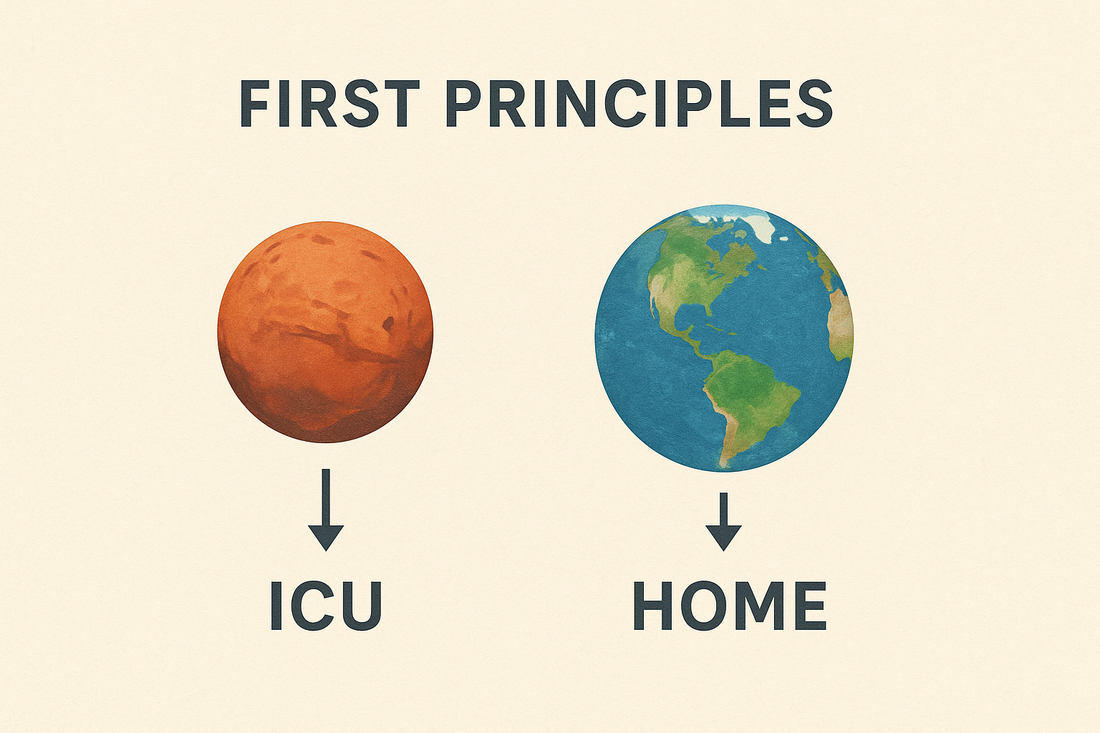
A First Principles Perspective on Mars Colonization
Share
In popular media and science fiction, “colonizing Mars” is often portrayed as humanity’s escape route. Facing environmental crises and dwindling resources on Earth, many imagine building a new home on another planet. Yet if we return to the first principles of science and to the consensus of evolutionary theory, it becomes clear: this vision is little more than self-deception.
1. First Principles: The Foundation of Life
First principles strip away appearances and point to the underlying facts.
For life, the fundamental fact is:
-
All life depends on a complete and stable ecosystem.
-
Ecosystems are not engineered—they emerge from countless interlocking chains of organisms, energy flows, and material cycles.
-
This structure is not designed but is the product of billions of years of random variation and accumulation through evolution.
Human beings survive not because of our intelligence alone, but because we stand at the top of an evolutionary pyramid supported by countless layers of life beneath us.
2. Earth: The Depth of Evolutionary Accumulation
On Earth:
-
Plants capture energy through photosynthesis.
-
Microbes and fungi recycle organic matter, maintaining soil and nutrient cycles.
-
Herbivores, predators, insects, and birds weave together a vast web of energy transfer.
This invisible network provides the air we breathe, the food we eat, and the climate stability we depend on.
Without these lower layers, humans—the apex species—could not survive independently.
3. Mars: An Empty Stage
And Mars?
-
A thin atmosphere, unable to shield us from radiation.
-
An extreme scarcity of liquid water, making ecosystems impossible to establish.
-
No natural food chains, no microbial foundations.
-
No billions of years of evolutionary accumulation, no ecological niches.
In other words, Mars is nothing more than a bare stage—no actors, no script.
To imagine building a “habitat dome” there is to believe we can replicate on steel and plastic what Earth achieved over billions of years of evolution.
4. First Principles Against Colonization
-
Principle: Life requires an evolved ecological chain.
-
Fact: Mars has none.
-
Conclusion: Colonizing Mars can at best create a temporary experiment, but never sustain a real civilization.
It is like this:
-
Earth is a full city, with electricity, water, and food supplies.
-
Mars is only an ICU (Intensive Care Unit)—a place to keep someone barely alive, but never a place to truly live.
5. Protecting the Only Home
Mars is not a second home; at most, it is humanity’s ICU. The only home we have is Earth.
Our true responsibility is not to escape, but to protect what we already have:
-
Slowing climate change;
-
Restoring ecosystems;
-
Creating sustainable energy and housing solutions.
This is not just scientific consensus—it is the clearest path for humanity’s survival.
🌍 First principles remind us: humanity cannot reproduce Earth’s billions of years of evolution on Mars. Earth is our only home.
